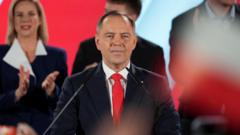Amidst Poland's polarizing political climate, Ukrainian refugees voice their fears as instances of bullying, public abuse, and anti-Ukrainian rhetoric rise sharply.
Rising Xenophobia: Ukrainian Refugees Feel the Heat in Poland

Rising Xenophobia: Ukrainian Refugees Feel the Heat in Poland
As tensions increase in Poland, Ukrainian refugees report a surge in anti-Ukrainian sentiment, impacting their safety and well-being.
In recent months, Poland has experienced a notable rise in anti-Ukrainian sentiment, leaving many refugees feeling unwelcome and unsafe. Ukrainian mother Svitlana (a pseudonym) shared her dismay after her daughter was bullied at school. Initially embraced by Polish society following Russia's full-scale invasion in February 2022, many Ukrainians now report incidents of abuse, both online and in public spaces.
School environments that once fostered inclusivity for Ukrainian children have shifted dramatically. Svitlana recounted her daughter's experience of classmates jokingly mimicking missile alerts, a painful reminder of the trauma they still endure from back home, where Russian missiles recently targeted their hometown in Ukraine. “It's frightening to live here now,” Svitlana expressed, highlighting a growing sentiment among Ukrainian refugees that they no longer feel accepted.
The data reflect this troubling trend, with recent polling indicating that support for Ukrainian refugees among Polish citizens has fallen significantly. While 81% of Poles favored supporting refugees two years ago, that number has plummeted to just 50% in a recent survey. Activist Natalia Panchenko, who heads the Warsaw-based 'Stand with Ukraine' Foundation, noted that while many Poles continue to offer support, there’s also a concerning increase in xenophobic rhetoric.
Poland's upcoming presidential election has further exacerbated these issues, with candidates using the Ukraine crisis as a political pawn. Extreme political rhetoric and an increase in far-right sentiments have altered the landscape of public opinion, causing candidates like Rafal Trzaskowski to downplay their pro-Ukrainian stance to win over centrist voters. This political tension is mirrored in everyday interactions, with Ukrainians in Poland facing a heightened risk of verbal and even physical abuse based on their nationality.
The disinformation campaign targeting Ukrainians, fueled by Russian propaganda, has only added to the toxic atmosphere. Michal Marek, director of an NGO monitoring disinformation in Poland, pointed out that misleading narratives claiming Ukrainians are abusing the Polish system have gained traction, further polarizing public sentiment against refugees. With the elections looming, many fear the long-term repercussions of these attitudes on the future of Ukrainian refugees in Poland.






















